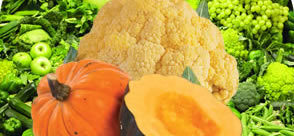Vegetables Pack a Powerful Punch Against Cancer
Be Healthful

Visit www.aicr.org/foods-that-fight-cancer for recipes and more information about superfoods.
To make an appointment for nutritional counseling, call 877-907-0859.
The concept of superfoods is new but gaining momentum: a Google search results in 4.5 million hits. While there isn't a formal definition, it is considered a low-calorie, high-nutrient food rich in vitamins, minerals, antioxidants and phytochemicals that promote good health. Superfoods are said to reduce the risk of chronic disease, including cancer, and prolong life. But is there any truth to these claims?
The American Institute of Cancer Research partnered with the World Cancer Research Fund to systematically review the scientific literature. They found that intake of foods rich in dietary fiber convincingly lowers the risk of colorectal cancer. Diets high in carotenoids, beta-carotene and vitamin C probably lower the risk of mouth, pharynx, larynx, lung and esophageal cancers. These cancer-preventing nutrients are found in abundance in cruciferous vegetables and winter squash.
Cruciferous vegetables include broccoli, cauliflower, Brussels sprouts, and cabbage, as well as dark leafy vegetables such as kale and collard greens. They are rich in vitamin C, which acts as an antioxidant and supports the immune system. They are also rich in glucosinolates, a phytochemical that can decrease inflammation, which is a risk factor for cancer. (Keep in mind that dark, leafy vegetables are high in vitamin K, so if you are on Coumadin you need to keep your intake of these foods consistent on a weekly basis to avoid wide fluctuations in your PT/INR labs).
Winter squash is another powerhouse vegetable. It is an excellent source of vitamin A and a good source of vitamin C and dietary fiber. While pumpkin is the winter squash most people are familiar with, acorn, spaghetti and butternut squashes are also great choices. Vitamin A and its precursors, beta-carotene and alpha-carotene, are important for promoting immune health and keeping cells healthy. Dietary fiber is important for weight control, which is a key prevention strategy for seven different cancers.
Start working toward a goal of five servings of cruciferous vegetables per week, and a total of 2.5-3 cups of non-starchy vegetables per day. This will ensure you are eating enough of these superfoods and receiving all the health benefits they contain.
Related article: Get tips for buying superfoods and prepping veggies
Read the Winter, 2015 issue of Thrive.
Get more information on nutrition, healthy eating and cancer prevention
You can also browse our Nutrition section.
